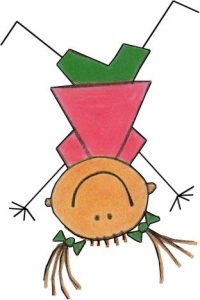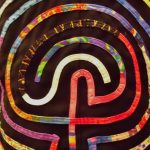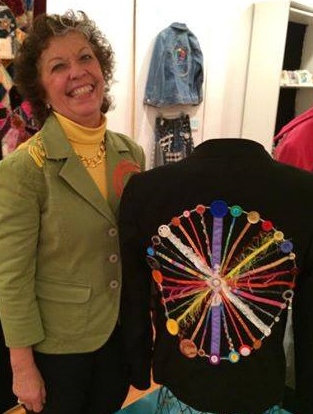A few weeks ago, during the recent Academy Awards Ceremony, I, along with many others, was blow away by Oscar winning writer Graham Moore’s  acceptance speech when he shared, “When I was 16 years old, I tried to kill myself because I felt weird and I felt different, and I felt like I did not belong. And now I’m standing here.” Graham Moore expressed openly what so too many CASIGYs™ (Creative, Acutely Aware, Super-Sensitive, Intense, Intelligent, likely Introverted, possibly Gifted You-s) secretly feel: a sense of being weird because of being different and therefore of not belonging─not finding a place in the world that’s suitable. I’d like to revisit this, and encourage CASIGYs™ everywhere to #Be Weird.
acceptance speech when he shared, “When I was 16 years old, I tried to kill myself because I felt weird and I felt different, and I felt like I did not belong. And now I’m standing here.” Graham Moore expressed openly what so too many CASIGYs™ (Creative, Acutely Aware, Super-Sensitive, Intense, Intelligent, likely Introverted, possibly Gifted You-s) secretly feel: a sense of being weird because of being different and therefore of not belonging─not finding a place in the world that’s suitable. I’d like to revisit this, and encourage CASIGYs™ everywhere to #Be Weird.
Many CASIGY™ children and youth observe, often from an early age, that they are different from the norm. Many times, there is also a pressure to conform, to be “normal” in order to fit in. Yet Graham Moore had found a way to stand out and be different in a good way. The audience at the Oscars gave Moore a standing ovation, and as they did, their faces showed identification with his pain, his struggle and his eventual victory. They also applauded his continuing message, “I would like this moment to be for this kid out there who feels like she’s weird or she’s different or she doesn’t fit in anywhere. Yes, you do. I promise you do. Stay weird, stay different and then, when it’s your turn, and you are standing on this stage, please pass the same message to the next person who comes along.”
Maybe you know a kindergartner who feels stifled when he wants to wear non-matching socks, or plaids and stripes  together and gets reprimanded by the teacher and made fun of by his classmates─if he’s lucky enough to get out of the house wearing something that will embarrass his mother. Maybe you know a seven year old feels rejected and excluded when she’s told she can no longer answer the kindergarten teacher’s questions to the class, so that others can have a chance to answer them. Maybe you know a nine year old who gets so overloaded with sensory stimulation at a family gathering that he implodes in a massive meltdown of tears and inability to talk about what’s happening inside of him and is called a crybaby by his family. Maybe you know an eleven year old who cannot bring herself to enter the classroom for another day of excruciating boredom and inability to meet requirements for volumes of tedious, tiring repetitive work and feels even more inferior than she already did when she gets labeled with multiple mental health diagnoses. Maybe you know a teen who wants to spend all day writing, drawing, painting, sculpting, or taking photos and instead has to sit through a boring, overstimulating pep rally and endless wearisome classes and decides to skip school and do his creative work instead. Maybe you know an adult who sees through the politically correct platitudes spoken by employers and sees the long term implications and effects of short-sighted decisions and speaks her mind about it to the horror of her co-workers gets reprimands by her supervisor. The opportunities for reinforcement of “not fitting in” and not belonging are ever-present. The dilemmas these create in the lives of CASIGYs™ can sometimes be daunting.
together and gets reprimanded by the teacher and made fun of by his classmates─if he’s lucky enough to get out of the house wearing something that will embarrass his mother. Maybe you know a seven year old feels rejected and excluded when she’s told she can no longer answer the kindergarten teacher’s questions to the class, so that others can have a chance to answer them. Maybe you know a nine year old who gets so overloaded with sensory stimulation at a family gathering that he implodes in a massive meltdown of tears and inability to talk about what’s happening inside of him and is called a crybaby by his family. Maybe you know an eleven year old who cannot bring herself to enter the classroom for another day of excruciating boredom and inability to meet requirements for volumes of tedious, tiring repetitive work and feels even more inferior than she already did when she gets labeled with multiple mental health diagnoses. Maybe you know a teen who wants to spend all day writing, drawing, painting, sculpting, or taking photos and instead has to sit through a boring, overstimulating pep rally and endless wearisome classes and decides to skip school and do his creative work instead. Maybe you know an adult who sees through the politically correct platitudes spoken by employers and sees the long term implications and effects of short-sighted decisions and speaks her mind about it to the horror of her co-workers gets reprimands by her supervisor. The opportunities for reinforcement of “not fitting in” and not belonging are ever-present. The dilemmas these create in the lives of CASIGYs™ can sometimes be daunting.
 Graham Moore’s winning an Oscar and sharing his victory along with his former pain inspires us because his struggle to find a place for himself in society echoes our own pain and his victory gives us hope that we can become victorious, too. But how do we do that? Right here, the temptation to oversimplify along with the need to “be perfect” arises in me. So, with the understanding that there are many other factors involved that there is not time and space to address here, and with the intent to find a middle path through a mine field of platitudes and perfectionism, I will proceed. In order to find and take our proper place in society, we need to develop our weirdness to a high level, that is, to develop our individuality. Or more accurately, to continue to develop it to deeper or higher level, which is to develop it more than many, even most, others do.
Graham Moore’s winning an Oscar and sharing his victory along with his former pain inspires us because his struggle to find a place for himself in society echoes our own pain and his victory gives us hope that we can become victorious, too. But how do we do that? Right here, the temptation to oversimplify along with the need to “be perfect” arises in me. So, with the understanding that there are many other factors involved that there is not time and space to address here, and with the intent to find a middle path through a mine field of platitudes and perfectionism, I will proceed. In order to find and take our proper place in society, we need to develop our weirdness to a high level, that is, to develop our individuality. Or more accurately, to continue to develop it to deeper or higher level, which is to develop it more than many, even most, others do.
Wait! Before you click away, let me explain. If the phrase “take our proper place in society” sticks in your craw, please hear me out.  By ‘taking our proper place’, I mean finding and inhabiting a psychic place that suits us, fits us and feels like home to us. This psychic place is an INTERNAL space that fits our personality, temperament, interests, gifts and abilities, and who we truly are, deep inside. Our proper place is where we are at home in ours own skin. For it is only when we are at home in our own skin that the acceptance of others has any hook to hang on, so to speak. Unless and until we accept ourselves from the inside out, with all of our foibles, our asynchronous development, our overexcitabilities, and sensitivities along with our strengths and abilities, that we will be able to recognize and inhabit our “proper place.”
By ‘taking our proper place’, I mean finding and inhabiting a psychic place that suits us, fits us and feels like home to us. This psychic place is an INTERNAL space that fits our personality, temperament, interests, gifts and abilities, and who we truly are, deep inside. Our proper place is where we are at home in ours own skin. For it is only when we are at home in our own skin that the acceptance of others has any hook to hang on, so to speak. Unless and until we accept ourselves from the inside out, with all of our foibles, our asynchronous development, our overexcitabilities, and sensitivities along with our strengths and abilities, that we will be able to recognize and inhabit our “proper place.”
Only when we are at home in our own skin can our proper place be one in which we reach deep within ourselves to use our gifts, talents and abilities to make a creative contribution to our communities. Needless to say, our proper place is not one in which we take on the roles and follow the dictates of society. We find “our proper place” when we discover how to connect and contribute in ways that are not only meaningful to us, but that fulfill our reason for being on this planet at this time and in this place, and that also meet a need for others.
But there are many temptations for people with multiple abilities. The first is to mistake our uniqueness for defectiveness. Another is to allow ourselves to be pulled or pushed this way or that, according to what others see in us, and how they want to use (or exploit) our abilities. Even after we finally feel at home in our own skins, a new challenge shows up. As Graham Moore also says, “I think my agents are probably in a room right now trying to find some way of convincing me to become like a big Hollywood muckety-muck. But I’m just too weird for that.”[i]
Our need to develop our weirdness, AKA our individuality, continues. Individuality demands that we each find our own path and our own  way through the wilderness, sometimes without a path. We may walk on a path now and then, and have traveling companions at times, but developing our individuality is often a lonely endeavor. As Graham Moore also says about the man who inspired “The Imitation Game”, “Alan [Turing] always seemed to me like this guy who was so isolated from everyone else, but it was precisely because of that isolation that he had this view of the world that no one else did(emphasis mine).”[ii]
way through the wilderness, sometimes without a path. We may walk on a path now and then, and have traveling companions at times, but developing our individuality is often a lonely endeavor. As Graham Moore also says about the man who inspired “The Imitation Game”, “Alan [Turing] always seemed to me like this guy who was so isolated from everyone else, but it was precisely because of that isolation that he had this view of the world that no one else did(emphasis mine).”[ii]
It can help us to get this: the isolation that many CASIGYs™ feel because of our uniqueness provides a “view of the world that no one else [has].” Yes, we want to belong; our children or students want to belong. Indeed, it’s important to belong. And especially for those with high abilities and/or multiple abilities, it’s also important to stand out and be different; to be who we really are. The uniqueness that seems to be a barrier to connecting with others and to belonging, is actually the ticket to recognizing who we really are and to making our creative contribution(s) in life.
Thus developing our individuality involves the complex paradox of connecting with our uniqueness, developing our gifts AND  following the lonely path dictated by those differences, interests and abilities as well as connecting with other people. It’s easy to misunderstand our differentness for inferiority. That’s what too many of us do, at least initially. We compare ourselves to others, notice the great contrast, and judge ourselves as inferior, especially when we possess one or more CASIGY™ characteristics such as creativity, acute awareness, sensitivity, intensity and/or high intelligence, and these characteristics separate us from our peers. These characteristics are not synonymous with our individuality; every person, with or without these characteristics has individuality. Possessing characteristics that are in the minority in a culture heightens the need for one to come to terms with and develop our individuality.
following the lonely path dictated by those differences, interests and abilities as well as connecting with other people. It’s easy to misunderstand our differentness for inferiority. That’s what too many of us do, at least initially. We compare ourselves to others, notice the great contrast, and judge ourselves as inferior, especially when we possess one or more CASIGY™ characteristics such as creativity, acute awareness, sensitivity, intensity and/or high intelligence, and these characteristics separate us from our peers. These characteristics are not synonymous with our individuality; every person, with or without these characteristics has individuality. Possessing characteristics that are in the minority in a culture heightens the need for one to come to terms with and develop our individuality.
 We COULD actually recognize these characteristics as being an engraved invitation to become more and more acquainted with who we are, and to accept ourselves in our uniqueness, with all of our foibles and vulnerabilities as well as well as our gifts. But do we? Not often. Certainly not easily. Civilization teaches us to pay attention to the culture, to listen to and see what others say, think, feel and do. It teaches us to give credence to others which often contributes to doubting ourselves. It is good to shelter young children from hurtful influences. It is also good to open our eyes to what is going on within us and around us. As we grow and mature, the sometimes necessary cultural messages embodied in the Three Little Monkeys may also lead us to cut off our observations and to stifle our voice. Instead, I would like to propose that we turn this around, into what I call ‘Monkey Magic’:
We COULD actually recognize these characteristics as being an engraved invitation to become more and more acquainted with who we are, and to accept ourselves in our uniqueness, with all of our foibles and vulnerabilities as well as well as our gifts. But do we? Not often. Certainly not easily. Civilization teaches us to pay attention to the culture, to listen to and see what others say, think, feel and do. It teaches us to give credence to others which often contributes to doubting ourselves. It is good to shelter young children from hurtful influences. It is also good to open our eyes to what is going on within us and around us. As we grow and mature, the sometimes necessary cultural messages embodied in the Three Little Monkeys may also lead us to cut off our observations and to stifle our voice. Instead, I would like to propose that we turn this around, into what I call ‘Monkey Magic’:
 In case you can’t read it in the image, here it is again: “Monkey Magic: We all know the “Three Little Monkeys, See No Evil, Hear No Evil, and Speak No Evil. I’m pleased to introduce the Nine Magical Monkeys: See what you see. Hear what you hear. Feel what you feel. Know what you know. Think your own thoughts. Say what you need to say. Do what you need to do. Be where you are. Be who you (really) are.” [iii]
In case you can’t read it in the image, here it is again: “Monkey Magic: We all know the “Three Little Monkeys, See No Evil, Hear No Evil, and Speak No Evil. I’m pleased to introduce the Nine Magical Monkeys: See what you see. Hear what you hear. Feel what you feel. Know what you know. Think your own thoughts. Say what you need to say. Do what you need to do. Be where you are. Be who you (really) are.” [iii]
 This right to exist as we actually are is what we all want, or say that we want. But it comes at a price; often a great price. Myth and fairy tale describe it in endless varieties. The theme that underlies them all is that our disagreeable, unpleasant life symptoms are the (engraved!) invitation to the adventure of becoming an individual. We can choose to refuse this call, or we can choose to accept it. When we accept it, we soon enter into metaphorical deep, dark woods, and it’s usually not long until we encounter (also metaphorical) dragons. Only after traversing the terrain hidden in the woods and facing the dragons can we find the buried treasure. But it’s still not over! We also discover, often to our dismay, that before we can bring the precious treasure we’ve found back to heal our own lives and share it with those in our communities, we have to return through those same deep dark woods, filled with more pitfalls and even more threatening creatures. No wonder we shy away and refuse the invitation. Hence the metaphor of “wandering in the wilderness”.
This right to exist as we actually are is what we all want, or say that we want. But it comes at a price; often a great price. Myth and fairy tale describe it in endless varieties. The theme that underlies them all is that our disagreeable, unpleasant life symptoms are the (engraved!) invitation to the adventure of becoming an individual. We can choose to refuse this call, or we can choose to accept it. When we accept it, we soon enter into metaphorical deep, dark woods, and it’s usually not long until we encounter (also metaphorical) dragons. Only after traversing the terrain hidden in the woods and facing the dragons can we find the buried treasure. But it’s still not over! We also discover, often to our dismay, that before we can bring the precious treasure we’ve found back to heal our own lives and share it with those in our communities, we have to return through those same deep dark woods, filled with more pitfalls and even more threatening creatures. No wonder we shy away and refuse the invitation. Hence the metaphor of “wandering in the wilderness”.
What we don’t know, or we quickly and easily forget, is that it is only through this process of exploring and getting to  know every inch of the metaphorical “Deep Dark Woods of Inner Territory”, that we develop our ‘essential individuality’. No wonder Graham Moore got a standing ovation when he shared a bit of his story, for we instinctively recognized that his victory came from much more than a simple decision to stay alive. As we cheered for him, we also cheered for ourselves─that is, for the parts of ourselves (for we always have ambivalence) that want the sense of the right to exist as we truly and actually are enough to accept the current invitation life has offered us and to go on our own Grand Adventures. Yes, we want it even when we know that our Grand Adventures will take us into those Deep Dark Woods in search of our own buried treasures … because we want that Buried Treasure. We don’t want it because of the difficulty and uncertainty of the trip. And then again we do want it so we can heal ourselves and then bring it back to help and heal our communities.
know every inch of the metaphorical “Deep Dark Woods of Inner Territory”, that we develop our ‘essential individuality’. No wonder Graham Moore got a standing ovation when he shared a bit of his story, for we instinctively recognized that his victory came from much more than a simple decision to stay alive. As we cheered for him, we also cheered for ourselves─that is, for the parts of ourselves (for we always have ambivalence) that want the sense of the right to exist as we truly and actually are enough to accept the current invitation life has offered us and to go on our own Grand Adventures. Yes, we want it even when we know that our Grand Adventures will take us into those Deep Dark Woods in search of our own buried treasures … because we want that Buried Treasure. We don’t want it because of the difficulty and uncertainty of the trip. And then again we do want it so we can heal ourselves and then bring it back to help and heal our communities.
So…where are you on your own Grand Adventure? What’s it like for you right now? And do you know of someone who has received this metaphorical “engraved invitation” but misinterprets it as an indictment of inferiority and unacceptability? Let me return to Graham Moore’s message to us all: #Be Weird.
And ….. if you’d like to have a Guide through this Wilderness of CASIGY™ Inner Territory, let me know. I would be honored to explore together with you the possibility of accompanying you, your child(ren) or teen(s) as you proceed on the path of developing your individuality, AKA, #Being Weird.
[i]http://www.jewishjournal.com/hollywoodjew/item/meet_oscar_nominated_graham_moore_hollywoods_newest_jewish_writing_prodigy
[ii] ibid
[iii] Monkey Magic © Sharon M. Barnes, LCSW, PLLC. Monkeys courtesy of Jo Freitag, www.GiftedResources.org

